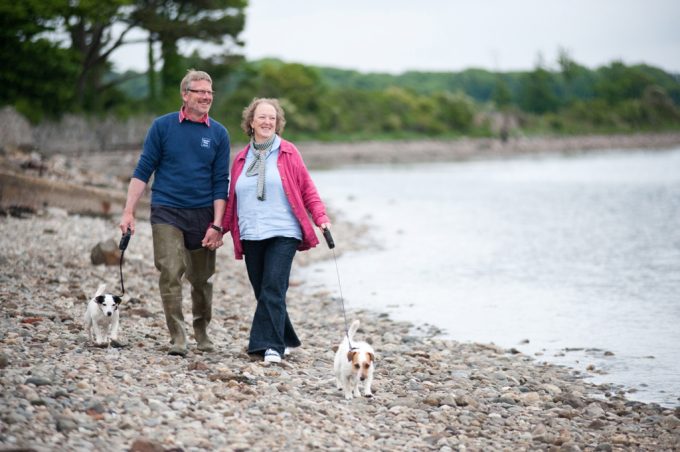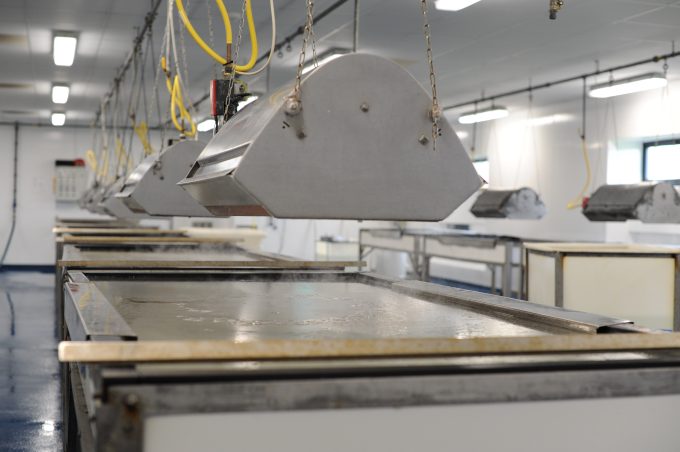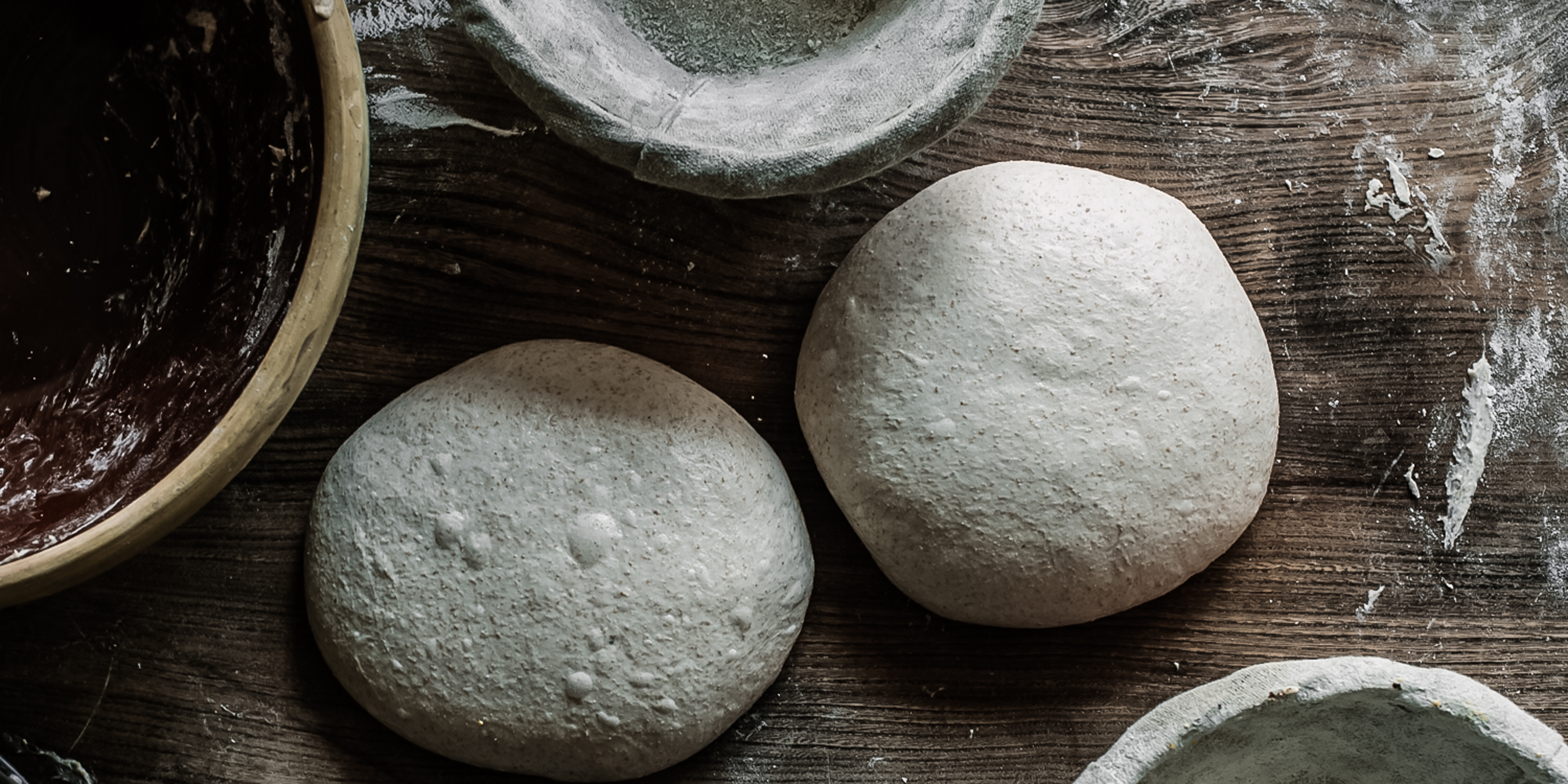Salt is always added to sourdough – and not just for the fact that it enhances the taste. The ions shield gluten’s charges from one another and enable the protein molecules to approach more closely, giving us a stronger and more stable dough to work with. You can literally feel the dough change as you add salt to it. It tightens.
You can buy our Sea Salt for Sourdough here.
I visited Halen Môn, the supplier of our salt at the School, a couple of weeks ago with my teenage son. I had explained on the way that despite a kitchen table start up I had no desire to compromise the ingredients we use at The Sourdough School on any level. To make the best sourdough, I told him, you need the best ingredients and this includes using the finest salt. I told him the story of how I first discovered how good it tastes. Despite my best efforts, he trudged about looking slightly disinterested, but whilst I was taking some photos he popped into the shop spent his pocket money buying salt for his auntie and I. ” It’s actually not bad,” he said ” So if it’s good enough for the Queen it’s good enough for you,” he said, beaming at me as he handed me a pack of oak smoked salt in the car. As I opened the bag I felt a wave of love, and I hugged him, perhaps out of sheer joy that he had listened to me, or love for his generous nature, or both.
I remember clearly developing a taste for the finest unprocessed, unrefined, unadulterated sea salt as a child in South West France. Learning to appreciate flavour at such a young age goes some way to explaining why I’m slightly infatuated with great foods. I have a collection of salt from all over the world. I hoard them in pots on the shelves, amongst the nuts and the seeds; sparkling like jewels in jars. The range of colours, and flavours is amazing. Understanding the transformative powers of salt from a very early age actually came about when I worked in the kitchen in the restaurant where they used both fat and sel gris liberally. I’d run to the restaurant after finishing helping at the bakery, often with warm loaves sent form the baker tucked under my arm.
Angelic, a bright-eyed French cook in her seventies, welcomed me into the kitchen. She would put me to work slicing tomatoes from the garden and then throw salt over two dozen plates of fresh warm sweet sliced tomato salads, before telling me which plates to take to which tables. If I got back quickly enough I’d have time pick up any escaped crystals using the pads of my fingers, before she wiped the table down. As I’d taste it, Angelic would tut with mock disapproval. It was intense, both sweet and salty, and I could sense the minerals on my tongue. It is a love affair that has never ended.
I’ve never been able to make do, especially when somethingI love or want is attainable or affordable. I’d admit that it makes me hard to live with, but on the other hand it is reflected in the love of what we do here. Our sourdough starter, for instance, are at the heart of the bread making at the school; they are certified organic by the soil association and all maintained using only the finest organic flour. Like most bakers, we love to chat about flour, discussing the relative merits of different flours – everything from where and how the grain was grown, protein content, to how it was milled and stored, and it is very relevant to the bread. Whilst we bakers can often seem slightly obsessed with flour, or how robust our starter is,m I have often noticed that salt, which is essential to making great bread, is a subject that bakers overlook.
We’ve maintained the use of the finest natural sea salt in all the food we make since the first day we started teaching sourdough, however, over the years bakers have accused of wasting good salt in bread. “ You cannot possibly taste the subtleties,” and “ it is a waste of money” or “ it makes no difference to the bread,” are accusations that have often been thrown my way, more often that not by bakers who have to compromise due to cost implications.
Using sea salt however, is beyond cost implications especially when you translate it into real terms. A 1kg bag of Halen Mon sea salt costs £22.50. If you make 1 x 800g loaf per year using 10g of salt this will last you just shy of 2 years. It seems all the more reasonable then you consider that it not only enhances sourdough nutritionally it also contributes to sourdough rheology. Magnesium, for example acts as a growth stimulant for yeasts in sourdough providing the necessary tools for replication and survival during fermentation process. These salts not only aid in the sourdough process, but also interact with the main proteins (gluten) present in the flour. Sulphates in particular stabilises proteins by within the flour by forming interactions and thereby help strengthen the dough structure (INSERT Holmes et al, 1999). Sulphate salts in particular, have been shown to have stronger dough strengthening properties compared to chloride salts.
Natural Salt contains all of its trace minerals and other elements that are naturally a part of its origin and it is never exposed to chemicals and does not contain anti caking agents. There is evidence that increased consumption of processed food, modern horticulture methods such as hydroponics and use chemical fertilisers, longer food storage times and long-distance transport, all contributed to a reduction if nutritional value of the foods we eat, including the minerals. Sea salt contains many trace minerals that are essential to human health, and is a simple effect way to layer in those essential nutrients back into our dally diets.

Halen Môn
The main salt we use here in our sourdough is from Halen Môn. It’s bright, clean and delicious with an iridescent sparkle and it is harvested by hand by a small family-run business based in North Wales. We’ve been using this exquisite salt for about 5 years now and I’ve finally had the opportunity to catch up with Alison Lea-Wilson, one of the founders of the business, on a recent trip to Anglesey.
Looking around and seeing how the salt is hand harvested, and chatting with Alison gave me an real insight into the amount of care taken in producing this deceptively simple product in a sustainable way, and why this salt has so much synergy with our philosophy.
Halen Môn, which translates from Welsh as ‘Anglesey Sea Salt’, is set on the breathtakingly beautiful coast of Anglesey. ( It was so beautiful in fact, that as we neared the Saltcote and Visitor Centre, my teenage son demanded that we stop the car and get out to take some photos.)
The stunning location is actually the legacy of a previous business that Alison and her husband David ran. They started out farming oysters and mussels in the clear, clean waters of the Menai Strait. The shellfish farming then developed into the Anglesey Sea Zoo, where visitors were able to learn more about the natural life in the waters surrounding the island. But both of these businesses were seasonal. Harvesting and marketing sea salt complemented their existing work, and allowed Alison and David to provide year round employment for their staff.
Perhaps the one thing I really hadn’t actually appreciated before visiting Halen Môn, is the level to which this really is a handmade product. In the same way a loaf of sourdough bread is hand made. It is made with care and love and attention. The process seems simple, but it has been fine-tuned over years to ensure a consistently high quality product. Alison explained that the especially clear waters of the Menai Strait, the body of tidal water that separates Anglesey from mainland Wales, is really important in the production of very pure salt. “We’re very lucky on Anglesey, because there is no heavy industry and no heavy ships going through” says Alison, before going on to explain, “there’s a strong shellfish industry here, so it’s in everyone’s best interest to keep the water pure.”
The Process.
Seawater is pumped from the Menai Strait into holding tanks. After being filtered to remove any seaweed or sand particles, the water is warmed in an evaporator, a process which begins to concentrate the salt. The next stage in production involves careful blending of batches of brine to achieve the right level of salinity. The brine is then pumped into shallow tanks, where the salt crystals begin to form. The crystals grow on the surface of the water, falling to the bottom of the tank when they become too heavy to float. They can then be gently scooped up by hand, and carefully rinsed until they have the right taste, texture and “degree of sparkle”. The salt crystals are dried at a low temperature, until the moisture content is just right to keep the salt crisp.
Synergy with our values.
I love that sustainability is central to everything they do at Halen Môn. “We do it in little ways as well as big ways” says Alison. Like our sourdough here, The Soil Association certifies the salt production. But it’s not just in the methods used to extract the salt from the sea water that the environmental impact is taken into account. Everything from sourcing as locally as possible to using energy efficient technology and recycling wherever possible, contributes to the aim of reducing their carbon footprint. Outside, there’s a wildflower meadow sown using seed harvested from another meadow close by. “And in our turn, we will give seeds to other people, and so it continues” says Alison. Their dedication to creating an ethically and environmentally sustainable business has been recognised by numerous awards. In 2014, Halen Môn sea salt was awarded Protected Designation of Origin (PDO) by the EU. This puts it in a category of foods and drinks that are recognised as unique to a specific region, alongside champagne, prosciutto and feta cheese. Alison and David are also very excited to have been awarded the Queen’s Award for Sustainable Development this year. “We’re absolutely thrilled by that,” says Alison happily, “that’s the absolute pinnacle really for us.”
I’m not the only one who is completely taken with Halen Môn salt – it is a favourite with chefs around the world, including Heston Blumenthal and Ferran Adria. One lovely touch in the packaging of the salt is that each carries the initials of the person who made the salt and the date it was harvested. It really appeals to me that despite growing and evolving over the years, the business remains a family affair. Alison and David’s three children all help out when they can. You can read their daughter Jess’s blog posts and recipes on the Halen Môn website, while sons Hamish and Jake help out on the financial side of things, and are the creative whizz behind the website and the videos used to promote their work.
Visit Halen Môn at –
Ty Halen
The Anglesey Sea Salt Company Ltd
Brynsiencyn
Isle of Anglesey
LL61 6TQ
http://www.halenmon.com/





 Ten Belles Paris – challenging the way the French think about bread
Ten Belles Paris – challenging the way the French think about bread
A very interesting article on the use of “good” salt in bread making but………… Halen Mon contains 96.65% of sodium chloride. This figure would be higher if the salt was completely dry but the nature of sea salt means that it contains more water.
How then are you able to claim that the magnesium salt in Haled Mon sea salt feeds the yeast when the salt contain such a minuscule amount? Does it really only require tiny amounts to have this effect?
Also what is the sulphate salt you refer to? Is it sodium or magnesium?
Sorry to be picky, but after finding the book Salt: A World History I became rather too interested in salt and its effects on health, both good and bad. I use kosher salt in my bread and cheesemaking because of the lack of additives.
The Un rinsed salt contains more as follows.
Chloride – 50.12 g/100g
Calcium – 0.116 g/100g
Magnesium – 0.436 g/100g
Potassium – 0.175 g/100g
Sodium – 24.2 g/100g
Calcium Carbonate – 0.29 g/100g
And the calcium carbonate, typically in rinsed salt it falls between 0.1 – 0.15 g/100g, on average half as much
After that I am afraid you will have to get in touch with Halen direct as I don’t have any more information.
A lovely interesting article. I’ve used Sea Salt for many years and would not use anything else in either my cooking or baking.
The only time I use the traditional table salt is to defrost my garden paths of ice.